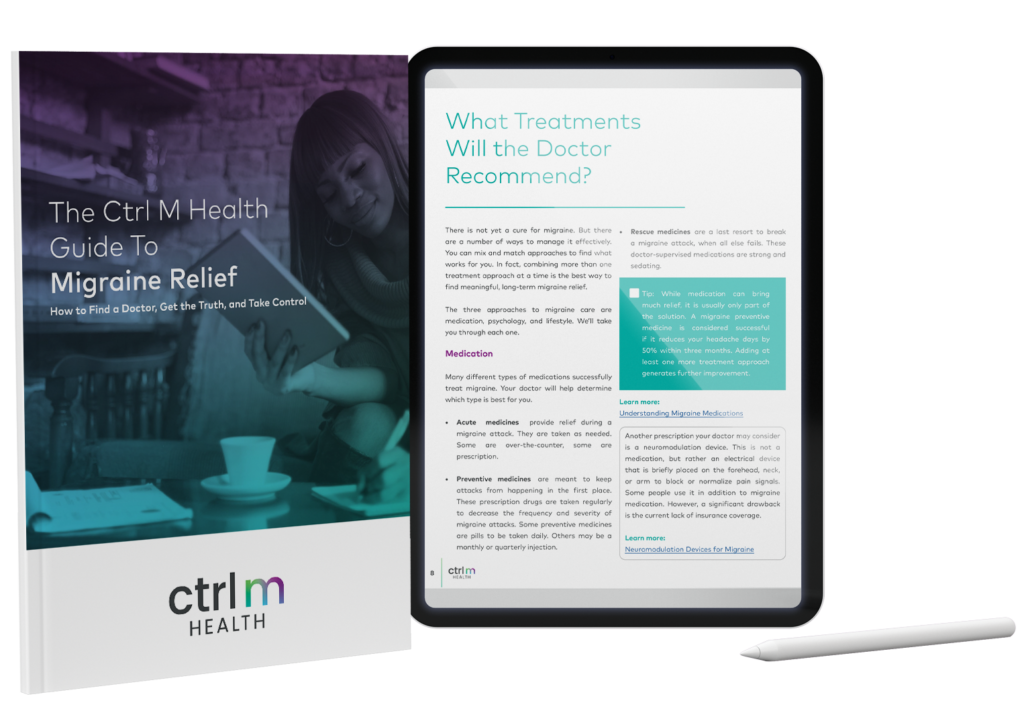Not everyone with migraine needs to see a doctor who specializes in migraine headaches. In fact, most migraine patients are managed by their primary care physician or neurologist. These doctors are trained to diagnose and manage simpler headache disorders, and represent the front line of headache care.
But because headache disorders have such a wide spectrum of severity — from mild to severe, from common to rare, presenting in typical and atypical ways — anything but the most straightforward cases tend to be outside their training. Therefore, if they suspect a more severe or complicated disorder, it may be time to see a doctor for migraine headaches who specializes in the field.
When To See a Specialist For Migraine Headaches — And The Benefits

A headache specialist is a doctor who, after getting a primary specialty (for example in internal medicine, family medicine, or neurology) has chosen to then get years of training in the treatment of headache disorders.
Headache medicine is a certified medical specialty by the United Council for Neurologic Subspecialities, with its own board exam certification. (Note: The certification is new enough that older providers may not have it.) In their fellowship training, specialists learn about a wide variety of headaches, treat the most complicated and rare headache disorders, and are at the forefront of headache knowledge and treatments.
The benefits of seeing a headache specialist include:
-
- Seeing a physician with the most up-to-date knowledge in headache disorders and their treatment.
- Doctors with experience recognizing, diagnosing, and managing complicated disorders.
- A more aggressive approach to headache management and treatment. For example, one study of children and migraine found that although triptans are the preferred first-line prescription medication to stop acute migraine attacks, non-headache specialists prescribed it in half as many cases as did headache specialists.
- Seeing a physician with a broader range of effective treatment tools for headache, such as nerve blocks and Botox injections. In situations when rescue medications fail, some headache specialists do infusions, avoiding emergency room visits.
- Headache specialists are holistic. They’re aware of the difficulties people with migraine face, as well as other health conditions associated with migraine disorder. They seek to treat not only migraine symptoms but the individual as a whole, which often involves integrative care.
Is It Time To See A Headache Specialist?
Always talk to your primary care physician first about your headache. But you could potentially benefit from seeing a specialist if:
Your headache hasn’t improved despite treatment. Your doctor has tried multiple preventive and acute medications without success.
Your headache is worsening despite treatment. Your headaches are getting more intense or more frequent (more than two headache days per week).
You have atypical symptoms with your headache. This includes constant or long-lasting auras, vertigo, weakness, or numbness associated with pain.
You are overusing acute medications. You are taking relief medications more than as directed, especially medications containing opioids and butaltalbital. Medication overuse can create “rebound headache,” worsening your migraine and further complicating treatment. Note: If this describes you, do not go off your medications “cold turkey.” Safe medication withdrawal is best managed by an experienced headache specialist.
Your primary physician suspects you have a complicated or rare headache disorder.
You have increased disability due to headache. Consider how much your headache is affecting your work, academic performance, family time, or personal relationships.
You are pregnant or looking to become pregnant. A number of migraine medications should be avoided due to potential harmful effects on a fetus. Headache specialists are trained in the use of acute and preventive headache medication in pregnant women. Often this treatment is done with the support of the patient’s gynecologist.
You want or need access to the newest treatments. When a new treatment becomes available, a headache specialist often begins prescribing it to their patients months or years before a non-specialist.
The Care Tuner Guide to Migraine Relief
Untreated migraine tends to worsen over time, so if you suspect you have migraine, it’s important to get help. We’ve compiled everything you need, including what to expect, pitfalls to avoid, and what you can do right now to get relief.

Finding a Headache and Migraine Doctor
One challenge in deciding when to see a specialist for migraine headaches is the low number of providers in the face of high demand. Despite a large population of people with headache disorders, there are only about 550 specialists practicing in the U.S.! But don’t be discouraged. Ask your primary care physician for a referral, or find a headache specialist nearest you through the American Migraine Foundation’s Find-a-Doctor tool. Once you find one, your first visit to a specialist can go a long way in your migraine journey.





